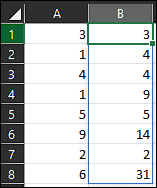Part of Code Golf Advent Calendar 2022 event. See the linked meta post for details.
Fen is a magician Elf. He can cast spells on an array of numbers to produce another number or array of numbers.
One of his inventions is the Wick spell. He loves to use this spell because "once this spell is applied, a combination of prefix sum spells and change number spells becomes magically cheaper".
Task
Implement Fen's Wick spell.
- Given an array of positive integers
Aof lengthn, - Replace each item at 1-based index
iwith the sum of lastjelements, wherej == 2 ** (trailing zeros of i in binary).
For example, if the given array is A = [1, 2, 3, 4, 5, 6, 7, 8, 9, 1],
Wick(A) = [
1, # 1
3, # 1+2
3, # 3
10, # 1+2+3+4
5, # 5
11, # 5+6
7, # 7
36, # 1+2+3+4+5+6+7+8
9, # 9
10, # 9+1
]
Standard code-golf rules apply. The shortest code in bytes wins.
Test cases
[] -> []
[999] -> [999]
[3,1,4] -> [3,4,4]
[3,1,4,1,5,9,2,6] -> [3,4,4,9,5,14,2,31]


